- Home
- Steve Cole
Z. Raptor Page 2
Z. Raptor Read online
Page 2
But the couple just hurried past, acting as though he wasn’t there.
“Please!” he yelled after them. The Lexus was getting closer. Adam darted across the street and fled through a litter-strewn side alley. It ended abruptly in a high chainlink fence, beyond which was a small private lot full of Christmas trees for sale. Looking back, Adam saw the nose of the Lexus pressing into sight from one direction as Gray Cap ran into the alley from the other.
Adam threw himself at the fence. It rattled and bucked as he scaled it, his feet slipping, the wire links biting into his hands. He wanted to scream—This can’t be happening to me again—as he heard a car door open and slam behind him.
“Adam Adlar!” His name was thrown down the alley in a low American accent. “Wait. We need to talk with you.”
“Stay away!” Adam yelled back as he swung himself over the top of the fence. He hung on precariously for a few moments. Then the echo of footfalls running hard and close pushed him over the edge like a physical force. He dropped down into a ragged pile of broken tree branches and foliage. The needled branches scratched and bit. Adam fell hard, but his ankles held out. The Christmas tree vendor, a short, stocky guy, jumped up from his chair, started shouting. “Hey! What d’you think you’re doing?”
“Stop him!” Gray Cap shouted. “He hit my wife and stole my billfold!”
“I never!” Adam stumbled toward the tree vendor. “Please. These guys are after me—”
“And they’ll get you too, you thieving punk.” The man lunged at him, doughy fingers splayed, clutching for his coat. Frantic now, Adam dodged aside and sprinted for the exit to the lot. “Thief!” the vendor yelled after him. “Someone stop that kid!”
No heroes stepped forward from the small crowd gathering to gawp nearby, and Adam knew he couldn’t hope for help from a cop now. As he burst out onto West Thirty-ninth Street, he pelted onward, bypassing the heaving sidewalk for the side of the road, ignoring the blaring horns and shouts from cyclists. Adam was oblivious to anything but the need to get away. He hit Seventh Avenue and realized that in his confusion he’d headed east again, doubling back on himself. Just keep going. Blocks became a blur. Crowded yellow cabs, neon menorahs, police-car lights and store displays spun in Adam’s sight as he forced himself to run on and on....
He came to Penn Station and stopped running, doubled over, catching his breath. It was like a vision—the place was heaving with cabs, picking up passengers for the rail service as fast as they could drop them off.
Hope surged through him. He ran out onto the crosswalk despite the glaring red hand warning him not to and slipped and dodged through a moving maze of bumpers and hoods and blaring horns to reach the station entrance where the taxis gathered. “I need a cab,” he snapped, pressing his face against the driver’s side window. But the taxi just pulled away, almost knocking Adam back out into the road. He turned to the next cab in line as it trundled forward to fill the space and collect the next huddled group of travelers. “Please,” he said to its driver, ignoring the angry babble from the people who’d been waiting. “I’m sorry to cut in—”
Then, with a sudden squeal of brakes, another taxi jerked to a halt close by, double parking. “Hey!” A man with black, unkempt hair leaned out and smiled at Adam. “Need a ride?”
The first cabbie stared in outrage. “The line starts at the back, jerk.”
The man’s voice hardened. “But this kid’s not in line, is he? Sooner I take him off your hands, the better, right?”
A barrage of horns went off, but Adam barely noticed the filthy looks hurled his way as he threw open the passenger door and slid onto the backseat. “Thank you,” he panted, shaking. “You saved my life.”
“Then you’d better give a good tip,” quipped his driver, through the thick glass partition. There was an Asian look about his features, and maybe a Texan drawl to his accent. “You look beat, man. Where are you headed?”
Adam searched his jumbled mind for the address his father had given him that morning. “Uh . . . can you drop me at the corner of Bleecker and Jones? I’ve got to meet my dad, as quickly as possible.”
“I just came that way.” The driver clicked his tongue. “Trust me, you don’t want to go to the Village.” He smiled into the rearview mirror. “Not when we’ve got your dad over on the East Side.”
Adam felt fingers of ice run down his spine. “No,” he breathed. “No, no, no . . .” He yanked hard on the door handle, but the safety locks were on. Then he noticed that the windows were tinted so no one could see inside. He hammered at the windows, tried to tug them down so he could shout for help, but they wouldn’t budge. Wildly, he twisted in his seat to try the rear windshield.
Through it he saw Gray Cap and two other men in the Lexus, following them steadily through the thickening traffic.
3
CALLING OUT
Who are you?” Adam demanded, trying to keep the tremor from his voice. “What do you want?”
“We only want to talk.” The driver opened up a small wallet, reached back, and slapped it against the glass partition. “If you’d taken a cab from your hotel—which would’ve been my cab, of course—none of this would’ve been necessary.”
With a shock, Adam saw that the wallet showed an ID card that could barely contain its bold, blue capitals: FBI.
“Special Agent John Chen,” the driver said.
“So . . . you and the guy with the gray cap, you’re the good guys?”
“Depends what TV shows you watch,” Chen said wryly. “The Federal Bureau of Investigation has several investigative priorities, including to protect and defend the United States from terrorist threats and high-technology crimes. We believe you and your dad can help us with our inquiries into the organization Geneflow Solutions.”
Adam felt a surge of hope. “You know about Geneflow?”
“Not nearly enough.”
“And so that’s why you want me and my dad?” Adam wanted more than anything to believe Chen, but found his rush of relief was quickly dammed. “Why didn’t you just call us at the hotel, ask us over? Why go to all this trouble?”
Chen’s voice betrayed weariness as he turned onto Forty-second Street. “This is no ordinary investigation, Adam.”
“Where are you holding my dad? FBI headquarters or something?”
“It’s kind of a long drive to Washington, DC, don’t you think?” Chen shook his head. “I told you, East Side—he’s been taken to the United Nations Plaza. There’s a UN watchdog group involved now. They’ve requested this interrogation take place on neutral, international territory.” He sighed. “It’s not the way I’d have liked this to play out, but we’ve all got to live with it, you know? Because you see, Adam, this goes beyond just American national security. It concerns the whole world.”
Tell me something I don’t know, thought Adam.
The rest of the journey passed in silence.
Adam supposed the United Nations headquarters was unusual for Manhattan—it was a huge glass skyscraper standing in its own space, free of rivals. Floodlights emphasized its stark form. A curving stretch of flagpoles stood on the plaza outside. Adam watched the various countries’ flags as they gusted in the breeze, bright in the winter darkness.
Chen’s bogus cab pulled up into a semicircular drive on First Avenue opposite Forty-sixth Street, while the Lexus continued on its way.
“They’re not coming?” Adam asked.
“Doug and the guys have got other stuff to do,” Chen said simply.
Armed police stepped forward to meet the cab. Chen got out and showed his pass, and Adam was relieved when the officers nodded and spoke into their radios. Chen opened the rear door, and Adam held his breath as he climbed out, the sight of so many guns making him uneasy. Then Chen steered him away through a gate in the wall ahead of them that led into a plain lobby. Two police escorts summoned an elevator and showed Adam and Chen inside. The doors slid shut behind them.
“I want to see my dad,” said
Adam, his voice sounding thin and quiet.
“We’ve set up in a conference room in the basement,” Chen told him. “Quiet. Private. Off the record.”
The doors opened to reveal two more impassive guards, who guided them down the corridor to a nondescript door. Chen knocked. Adam felt nerves tearing through his insides as the door slowly opened.
The room was long and painted cream, with a large projection screen on the far wall. A worn wooden table all but filled the space. And sitting on the near side, rumpled as ever, was Bill Adlar—eyes wide through his glasses, his thinning hair mussed and adrift. “Ad, thank God you’re all right!”
“I knew you’d find a way to get out of pizza tonight,” Adam joked weakly, grabbing his father in a clumsy hug. “Dad, I was so scared. This friend of his chased me through the city, tried to make out like I’d robbed someone so he could catch me. . . .”
Mr. Adlar frowned at Chen. “He did what?”
“Apologies for the cloak-and-dagger stuff tonight, guys,” Chen said. “But we don’t know if people from Geneflow Solutions are watching you already—and if they are, we don’t want them knowing we’re in contact with you.” He looked at Adam. “That’s why we couldn’t just wait for you to turn up at your dad’s offices and grab you there.”
Adam felt a familiar tingle of nerves. “Then . . . your friends in the Lexus were trailing us to see if anyone else was following?”
“That’s right.” Chen looked at Mr. Adlar. “You’ve got a sharp kid there.”
“I wouldn’t be here now without him,” Adam’s dad said simply. “But I’d sooner we were both somewhere else. I tried to warn the FBI months ago about Geneflow and their illegal genetic experiments in New Mexico. No one seemed interested then.”
“Yeah, well, things change.” Chen looked troubled. “Let’s not forget, Bill, you contacted the FBI anonymously. And you left out some of the more, shall we say, surprising aspects of your ordeal.”
“I didn’t know who I could trust.” Mr. Adlar didn’t break off his stare. “I still don’t.”
“None of us knows that, Mr. Adlar,” came a lofty, English voice. The conference room door swung open and a white-haired, owlish man, half buried beneath a long, dark coat and a white, winding scarf bustled inside. He sat down stiffly at the head of the table and shivered as though he still felt the cold. “I am Dr. Jeremy Marrs,” he announced, “chairman of the International Science and Ethics Association.”
Mr. Adlar looked coldly between Marrs and Chen. “Was it ethical to chase my son across Manhattan, scaring him half to death?”
Unruffled, Marrs put on a pair of gold, half-rimmed glasses. “I’m sorry if Mr. Chen’s methods lacked a little finesse. But we required the presence of both you and your son at this meeting without delay, and today’s youth are resilient, I am informed.” He smiled at Adam. “I’m confident your fine young man will bounce back.”
Patronizing idiot, thought Adam. But the man’s earlier words were playing on his memory. “Science and Ethics Association? I’m sure I’ve heard that name before—”
“Whenever new breakthroughs in genetic experiments are made, the United Nations consults the association—a loose collection of experts worldwide who consider the ethics of the work and advise on whether it should be allowed to continue.” Marrs turned to Adam’s dad. “Until recently, one of our key members in the private sector was a biomedical research executive called Jeff Hayden. I believe you know him?”
Hayden. Blood-soaked memories tore through Adam’s head at the mention of the name. The psycho maniac who started this whole nightmare.
“I knew Hayden,” said Mr. Adlar coldly. “Past tense. He’s dead.”
“According to his board of directors, Hayden’s taken a six-month leave of absence from work,” Chen informed him. “Off fossil hunting someplace.”
“And he sent me a video message confirming his resignation from the Science and Ethics Association,” Marrs added, “citing ill health as the reason.”
Adam looked at his dad, baffled. “But we know he’s dead.”
“The people at Geneflow are incredibly well prepared.” Mr. Adlar leaned forward in his seat. “If you were sent a video, Dr. Marrs, Hayden must’ve filmed it some time before as a contingency—to stop the authorities from looking too hard if anything happened to him.”
“Possibly,” said Marrs briskly. “In any case, I received an anonymous letter some months ago informing me of Hayden’s involvement with a global network of scientific activists, working on this Z. rex project. Am I right in thinking you wrote that letter, Mr. Adlar?”
Mr. Adlar hesitated, then nodded. “I didn’t sign it because I didn’t want to get Adam caught up in some big covert investigation. He’s been through enough. We both have.” He studied them both, anger simmering in his eyes. “And it goes on. You’ve scared us both witless tonight. Why?”
Chen cleared his throat. “Perhaps you should play the other video message you got, huh, Doc?”
Marrs looked at Adam. “I’m not sure it’s fit viewing for the boy—even if you do consider him an expert witness.”
Adam frowned, and Mr. Adlar opened his mouth to say something, but Chen was already clicking on a palm-sized remote. “Ten days ago the doc here received an e-mail,” the agent told them as the projector screen on the far wall glowed with bands of color; Adam saw an open laptop connected with an untidy loop of cable. “The video you’re about to see was attached.”
Marrs nodded gravely. “Special Agent Chen had already interviewed me regarding the activities of Geneflow and Jeff Hayden. So when I received this video, I brought it to his attention. You’ll see why.”
Abruptly, sound and color cut into the projected image. Adam felt his blood run to ice as grainy, unfocused footage of two creatures hazed into view. They seemed part bird and part beast, with dark, scaly bodies sprouting stiff quills around the shoulders. Their S-shaped necks flexed like serpents, and they had long, fearsome jaws. Then the image cut to a blurry image of a man running on a beach, dressed in jeans and a torn shirt, looking over his shoulder. A second later, a giant brown blur of speed and scales raced up behind him. A spray of red erupted from the man’s body as he fell. Almost in the same instant, two more of the nightmarish creatures pounded into view, their heads hunched forward on thick, sinuous necks, ready to tear into their share of the kill.
Horrified but unable to look away, Adam saw the image cut to something else—a blur of red scales and bloodied plumage, something standing too close to the camera.
“Tell them.” The voice was unearthly, cold as stone. “Tell them what Geneflow does. The danger.”
And the camera lurched to the left. The image of a woman, blond and haggard, her dirty face streaked with tears, was revealed. Behind her, pixelated palm trees were swaying under a pale sky. She stared into the lens. “This message is for the attention of Dr. Jeremy Marrs, chairman of the International Science and Ethics Association.” She had an American accent, and it sounded as though she were reading the words from a board, off camera. “I’m contacting you because you know Jeff Hayden, and you need to know about his work at Geneflow Solutions.”
“And Josephs,” the voice cut in. “Samantha Josephs.”
Adam had hoped he would never hear Josephs’s name again. She was Hayden’s right-hand woman, a brilliant but amoral scientist who could justify any action that got a desired result.
The frightened woman on the screen was trying to pick up where she’d left off. Adam was reminded of the horrible videos he’d seen on the news of soldiers captured by the enemy being forced to read their own ransom demands. “Please, please, you must help us. There are lots of people trapped here. And creatures . . . It sounds crazy, but they’re dinosaurs. Geneflow has bred dinosaurs. Raptors. They are smart. Deadly.” The woman shuddered visibly. “One of them is helping us to survive—Loner here.” She sniffed noisily. “We would’ve died a long time ago if not for him. He’s going to try to send this from Geneflo
w’s own computers. They . . . they don’t know he can get inside their base.”
“Quickly,” urged the eerie voice from off camera, distorting the microphone. “Brutes are coming.”
The woman’s face twisted in fear as she spoke faster, gabbling in breathless sentences. “We’re on a tiny island in the central Pacific, maybe six hundred kilometers south of Hawaii. There’s a big concrete bunker here, used in World War II. That’s where the base is. There is also a place to land a boat that’s marked with a stone pillar in the water. And a tower too . . .” She wiped her eyes and crouched down, barely in the shot, as if afraid to be seen even by the camera. “Please, please come.”
“Josephs and her kind are evil,” came the cold hiss of a voice. Adam felt a prickling through every hair in his body as the mass of red scales pushed back into sight and the focus blurred on a powerful, human-sized figure, half lost in shadow.
Then the figure stepped back. Adam flinched, and his father gripped the arms of his chair.
Confronting the camera, half in shot, was a reptilian nightmare. Though the picture lacked definition, those details he could see hit Adam like a stone. The beast’s scaly skin was complicated about the shoulders by a sharp tangle of quills. Stubby feathers with a steely sheen coated the powerful arms. The neck was an obscenely thick gnarl of flesh, and the crimson-striped face a mash-up of vulture and crocodile with long, toothy jaws. On its hind feet, Adam could see a huge, sickleshaped claw. The creature peered out from the screen with unblinking orange eyes. They were an animal’s eyes, and yet the woman’s grief seemed mirrored there.
The jaws creaked open. “You must be here before the experiment ends.” The cold scrape of its voice filled and chilled the conference room. “Before the feast.”
Then the screen switched to blank blue and a box that read NO SIGNAL. The creature’s last word hung in heavy silence. The message had ended.
4

 Welcome to Trashland
Welcome to Trashland Doctor Who: Adventures in Lockdown
Doctor Who: Adventures in Lockdown Doctor Who: The Knight, The Fool and The Dead (Doctor Who: Time Lord Victorious)
Doctor Who: The Knight, The Fool and The Dead (Doctor Who: Time Lord Victorious) Doctor Who - Combat Magicks
Doctor Who - Combat Magicks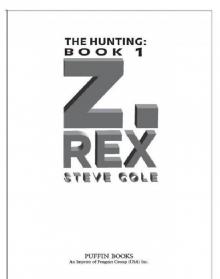 Z. Rex
Z. Rex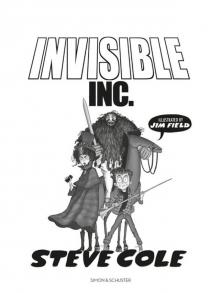 Steve Cole Middle Fiction 4
Steve Cole Middle Fiction 4 Astrosaurs 10
Astrosaurs 10 Astrosaurs 12
Astrosaurs 12 Astrosaurs Vs Cows In Action
Astrosaurs Vs Cows In Action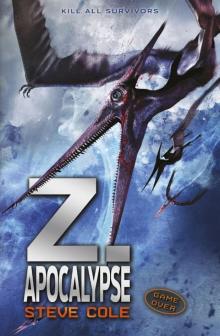 Z. Apocalypse
Z. Apocalypse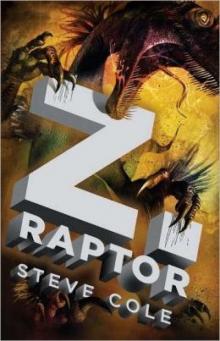 Z. Raptor
Z. Raptor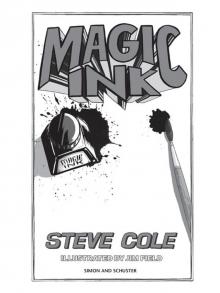 Magic Ink
Magic Ink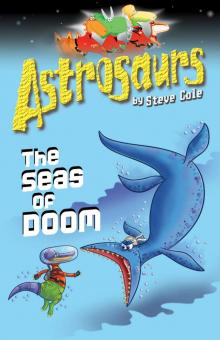 Astrosaurs 3
Astrosaurs 3 Astrosaurs 14
Astrosaurs 14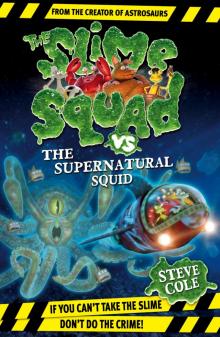 Slime Squad vs. the Supernatural Squid
Slime Squad vs. the Supernatural Squid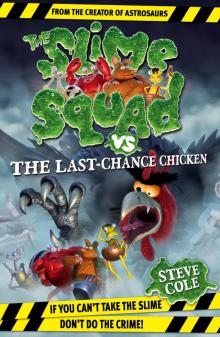 Slime Squad Vs the Last Chance Chicken
Slime Squad Vs the Last Chance Chicken Astrosaurs 6
Astrosaurs 6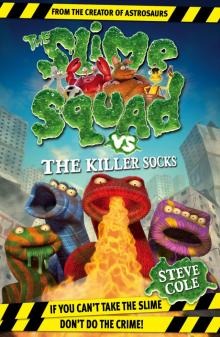 Slime Squad vs. the Killer Socks
Slime Squad vs. the Killer Socks First Cows on the Mooon
First Cows on the Mooon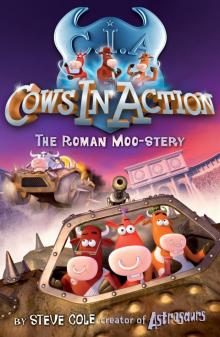 Cows in Action 3
Cows in Action 3 Astrosaurs 8
Astrosaurs 8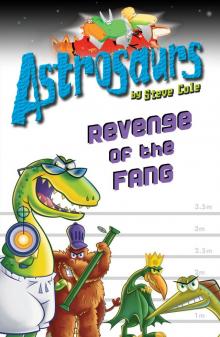 Astrosaurs 13
Astrosaurs 13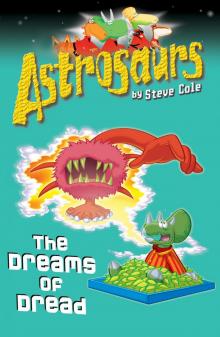 Astrosaurs 15
Astrosaurs 15 Astrosaurs 1
Astrosaurs 1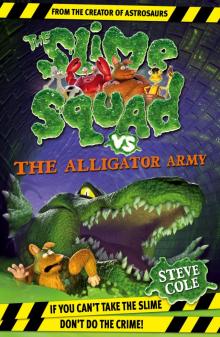 Slime Squad Vs the Alligator Army
Slime Squad Vs the Alligator Army Astrosaurs 20
Astrosaurs 20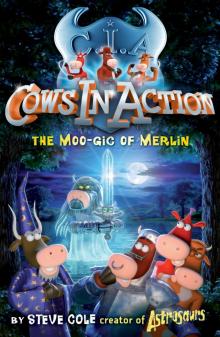 Cows In Action 8
Cows In Action 8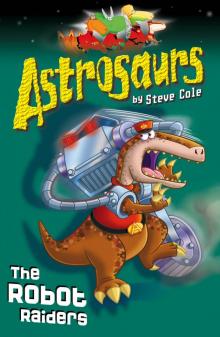 Astrosaurs 16
Astrosaurs 16 Astrosaurs 18
Astrosaurs 18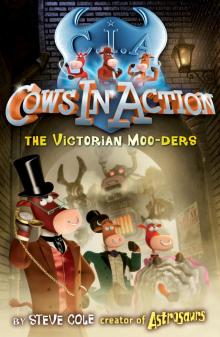 Cows In Action 9
Cows In Action 9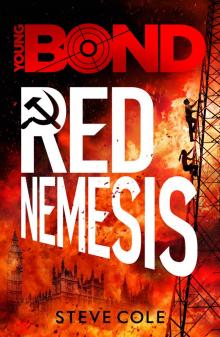 Young Bond
Young Bond Astrosaurs 9
Astrosaurs 9 Cows In Action 6
Cows In Action 6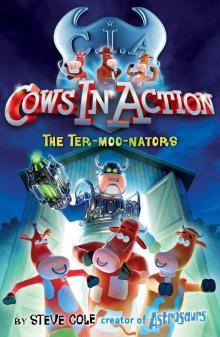 Cows in Action 1
Cows in Action 1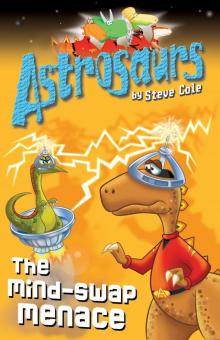 Astrosaurs 4
Astrosaurs 4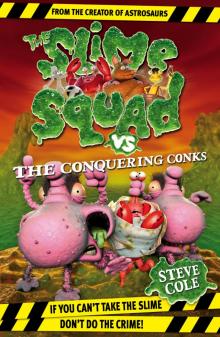 Slime Squad vs the Conquering Conks
Slime Squad vs the Conquering Conks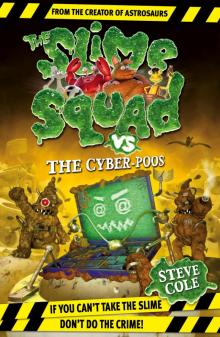 Slime Squad vs. the Cyber-Poos
Slime Squad vs. the Cyber-Poos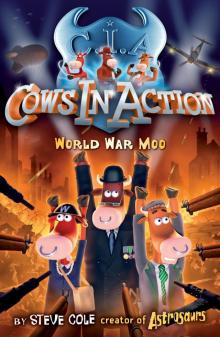 Cows in Action 5
Cows in Action 5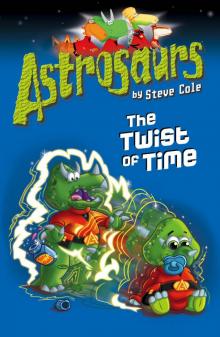 Astrosaurs 17
Astrosaurs 17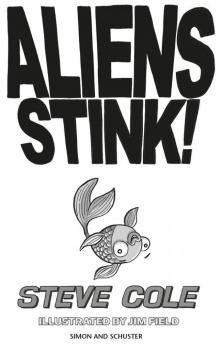 Little Green Gangsters
Little Green Gangsters Astrosaurs 11
Astrosaurs 11 Astrosaurs 19
Astrosaurs 19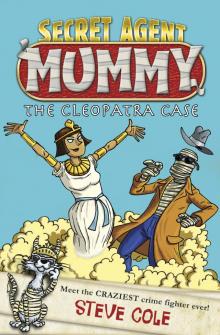 Secret Agent Mummy
Secret Agent Mummy Astrosaurs 21
Astrosaurs 21 Astrosaurs 22
Astrosaurs 22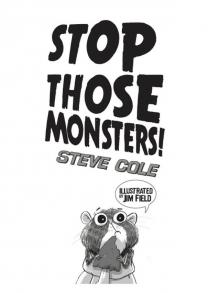 Stop Those Monsters!
Stop Those Monsters! Cows in Action 12
Cows in Action 12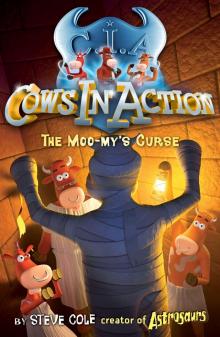 Cows in Action 2
Cows in Action 2